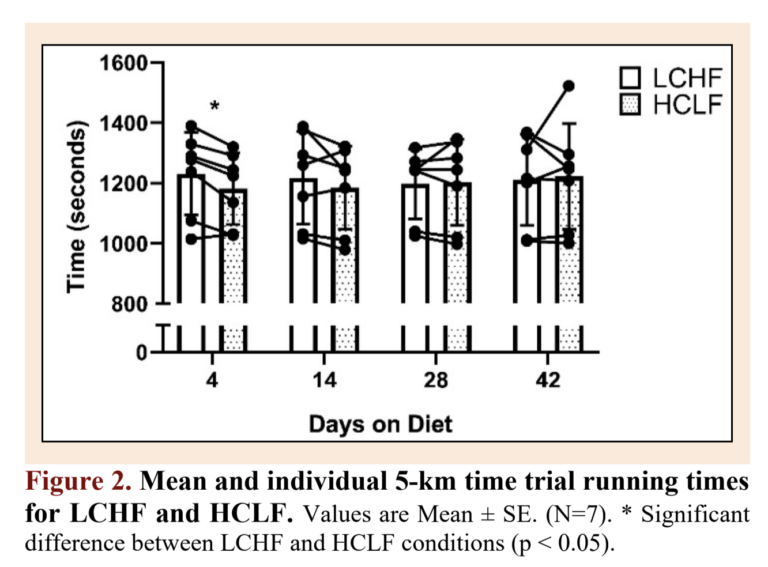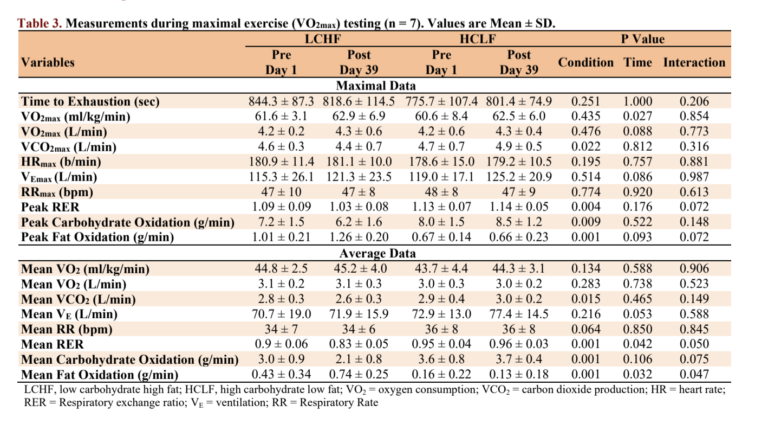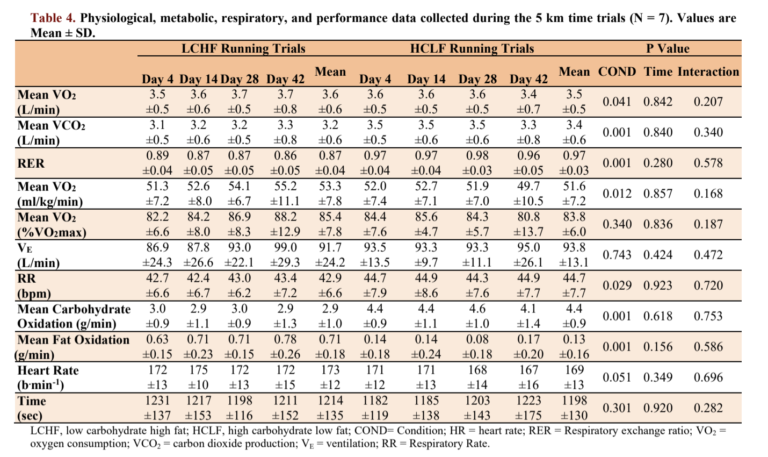Since the 1920s, it has been widely assumed high-intensity exercise is best supported by a high-carbohydrate diet, and the majority of trained athletes are given high-carbohydrate dietary recommendations (1). It has been more specifically argued that low-carbohydrate diets cannot support effective exercise at intensities above 75% of an athlete’s VO2max due to the limited ability of muscle to oxidize fat (2). Two studies are commonly cited as evidence that low-carb, high-fat (LCHF) diets impair performance (3), but a larger body of literature illustrates athletes following LCHF diets have higher rates of fat oxidation and similar rates of performance at varying exercise intensities, particularly after they have passed an initial (≤ four-week) metabolic adaptation period (4). This trial was designed specifically to test the relative performance of athletes following low-carb (LCHF) or low-fat (HCLF) diets during high-intensity exercise.
Seven recreationally competitive male distance runners followed a six-week low-carb or low-fat diet in random order, with a two-week washout on their habitual diets between phases. All subjects normally consumed a high-carb diet and ran a 5K in under 21 minutes. During the LCHF diet, subjects ate fewer than 50 grams of carbohydrate per day, while on the high-carb diet, subjects ate more than 400 grams of carbohydrate per day. During this six-week period, subjects performed time-to-exhaustion VO2-max tests on days 1 and 39, and 5K time trial (5KTT) tests on days 4, 14, 28 and 42.
Performance on the VO2-max trial was identical on both diets. Subjects ran more slowly during the first 5KTT on an LCHF diet four days after diet initiation, but there was no significant difference in performance between diets on the 5KTTs on days 14, 28, and 42. Individual and mean performance is shown in Figure 2 below.

During both the VO2-max test and 5KTT, subjects burned significantly more fat and significantly less carbohydrate while following an LCHF diet compared to an HCLF diet. During the VO2-max test, mean energy production was 8.4 kcal/min. from carbohydrate and 6.7 kcal/min. from fat on the HCLF diet. On the LCHF diet, mean energy production was 14.8 and 1.2 kcal/min. from carbohydrate and fat, respectively.
Metabolic behavior on the 5KTT was similar, with subjects deriving 35% of energy from fat while on an LCHF diet and only 6% from fat while on an HCLF diet. Fat oxidation was more than five times higher and carbohydrate oxidation one-third lower while subjects followed an LCHF diet rather than an HCLF diet. This data is consistent with previous research showing low-carb-adapted athletes derive more than half their energy from fat during lower-intensity exercise (5).


This trial demonstrates that after a short adaptation period, as seen in previous research (6), athletic performance is neither impaired nor improved by consumption of a low-carbohydrate diet compared to a more traditional high-carbohydrate diet. The authors note subjects following an LCHF diet demonstrated greater metabolic flexibility, relying on both fat and carbohydrate to meet energy demands, while subjects following an HCLF diet relied almost entirely on carbohydrate; this may lead to better performance during repeated or longer-duration exercise sessions. At minimum, it indicates a low-carbohydrate diet does not negatively affect performance beyond a small impairment seen during the initial transition period.